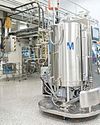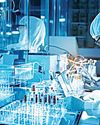Prøve GULL - Gratis
Can Knowledge Graphs Revolutionise Pharma R&D?
BioSpectrum Asia
|BioSpectrum Asia Feb 2024
In life sciences, the adoption of new standards such as Study Data Tabulation Model (SDTM) and Analysis Data Model (ADAM) is proving critical for efficient and effective data management and sharing. SDTM provides a new way of organising human clinical and nonclinical study data tabulations, which is required for data submission to regulatory bodies like the United States Food and Drug Administration (FDA) and Pharmaceuticals and Medical Devices Agency (PMDA) Japan, while ADAM defines dataset and metadata standards for clinical trial statistical analyses, ensuring efficient generation, replication, and review of data. The Clinical Data Interchange Standards Consortium (CDISC) 360 is another important initiative that aims to implement standards as linked metadata to support metadata-driven automation across the entire clinical research data lifecycle, making it easier for researchers to analyse and share their findings. The digital transformation of pharma industry regulatory processes, hence, has started to make data a key tool. However, with the increasing volume and complexity of data generated in drug discovery and clinical research, life sciences R&D practitioners need better ways of organising, structuring and exploiting their data, at scale.
-

To address the increasing volume and complexity of data generated in drug discovery and clinical research, the sector is increasingly adopting an innovative data structure approach, the knowledge graph. Graph databases can tackle complex problems in drug discovery, multiomics, and clinical research by allowing researchers to store and analyse complex interconnected data such as relationships between genes, proteins, cells, and tissues, as well as help the sector get better at meeting standards like SDTM and AdaM.
The main advantage knowledge graphs offer is their basic design. Unlike traditional SQL databases that use fixed tables with rows and columns to store data, knowledge graphs represent data as interconnected ‘nodes’ (or entities) linked by ‘edges’ (or relationships).
This network (a graph is a mathematical name for a network) of interconnections holds the key to unlocking breakthrough insights. The power of knowledge graphs is evident in their ability to represent complex data relationships. In the Panama Papers work, for example, a knowledge graph helped uncover an intricate network of opaque offshore accounts, shell companies, and individuals allowing investigators to connect the dots and uncover hidden relationships. These insights would have been difficult to detect using traditional data analysis methods.
Owing to their ability to represent intricate data, knowledge graphs have many applications beyond financial investigations. One such area is biological science, where knowledge graphs can capture the intricate interconnections and correlations among diseases, genes, environment, diet, behaviour, and other factors.
Denne historien er fra BioSpectrum Asia Feb 2024-utgaven av BioSpectrum Asia.
Abonner på Magzter GOLD for å få tilgang til tusenvis av kuraterte premiumhistorier og over 9000 magasiner og aviser.
Allerede abonnent? Logg på
FLERE HISTORIER FRA BioSpectrum Asia

BioSpectrum Asia
"The next 5-years will see mRNA science evolve beyond infectious disease"
A new survey from Moderna Singapore reveals persistent vaccine hesitancy among older adults in Singapore, even as international travel and year-end gatherings increase the urgency of protection. The findings point to clear opportunities to strengthen public health, including empowering healthcare professionals as trusted messengers and promoting co-administration of vaccines.
4 mins
BioSpectrum Asia Dec 2025
BioSpectrum Asia
No Funding No Vax for TB?
The World Health Organization (WHO)'s latest updates on tuberculosis (TB) released on November 12 reveal significant progress in diagnosis, treatment, and political commitment, but also expose deep vulnerabilities—especially in the South-East Asia Region (SEARO)—related to funding gaps and the uncertain future of novel TB vaccines. SEARO remains the global epicentre of the TB epidemic, carrying more than 45 per cent of the world's TB incidence despite representing only a quarter of the global population.
2 mins
BioSpectrum Asia Dec 2025

BioSpectrum Asia
Australia builds tailored heart pump to transform heart failure care
Despite making up half of the 64 million people living with heart failure, patients with this common form have no access to heart pump treatments and are left with only medication or palliative care.
1 min
BioSpectrum Asia Dec 2025

BioSpectrum Asia
Clinical Research Trends 2026: Hybrid DCTs Set for Surge as Innovation Outpaces Regulatory Hurdles
APAC's openness to innovation, combined with its large population and low trial density, creates strong potential for expanding decentralised clinical trials (DCTs), especially for patients with limited trial access. While regulatory diversity and operational challenges will continue to hinder fully decentralised models, the region is expected to adopt more digital technologies in clinical research. As a result, hybrid DCTs will keep gaining traction, and effective management of digitally collected data will remain a central focus for data science teams.
4 mins
BioSpectrum Asia Dec 2025

BioSpectrum Asia
CSL Seqirus to localise advanced influenza vaccine manufacturing in Saudi Arabia
Australia-based CSL Seqirus and Vaccine Industrial Company have signed a Memorandum of Understanding with the Ministry of Health of Saudi Arabia to enhance the biotechnology sector by accessing advanced cellbased seasonal and pandemic influenza vaccines and localising manufacturing in Saudi Arabia.
1 min
BioSpectrum Asia Dec 2025

BioSpectrum Asia
How Sponsors Could Gain Advantage by Embracing Dose Optimisation in Asia by 2026
In 2026, oncology drug development in Asia may move away from the historical maximum tolerated dose (MTD) paradigm toward evidence-based dose optimisation. Sponsors might consider adopting strategies similar to the FDA's Project Optimus, which emphasises selecting doses that balance efficacy and safety rather than relying solely on toxicity thresholds. Doing so could improve patient outcomes and position companies favourably as regulatory expectations evolve.
1 mins
BioSpectrum Asia Dec 2025

BioSpectrum Asia
Fujifilm launches joint research with National Cancer Center in Japan
Fujifilm Corporation has signed a joint research agreement with the National Cancer Center Japan, a Tokyo-based national institution recognised for its leadership in cancer care and research.
1 min
BioSpectrum Asia Dec 2025

BioSpectrum Asia
Monash spinout RAGE Biotech secures $29 M to advance next-generation RNA therapeutics
Australia's Monash University spinout RAGE Biotech has raised $29 million in Series A funding, marking a major step toward translating RNA-based therapeutics for chronic inflammatory disease into the clinic.
1 min
BioSpectrum Asia Dec 2025

BioSpectrum Asia
Submitting clinical data to the FDA and PDMA: An efficient and compliant approach
In both the US and Japan, regulators provide an extensive set of resources detailing the rules and specifications governing submissions for marketing approval of new drugs and biologics. Fortunately, despite some differences, the regulations concerning clinical data have a surprising amount in common. It is possible that with a solid understanding of the requirements and an adherence to best practices, sponsors can develop some of the same material for submission to both countries.
2 mins
BioSpectrum Asia Dec 2025

BioSpectrum Asia
Regenerative medicines and microbiome health are emerging as exciting frontiers, with Australian companies and researchers pushing into new therapeutic approaches
After more than a year at the helm of AusBiotech, CEO Rebekah Cassidy reflects on her early priorities and the organisation’s ambitions as Australia accelerates its position in the global life sciences economy. In an email interaction on the sidelines of AusBiotech 2025, she highlights the country's progress in mRNA, cell and gene therapy, and radiopharmaceuticals, outlines emerging areas of momentum, and discusses how new partnerships and MoUs are strengthening collaboration across the biotech ecosystem. Rebekah also outlines how AusBiotech is preparing Australia for a more competitive and connected global life sciences economy and the strategic priorities shaping AusBiotech’s next chapter. Edited excerpts:
7 mins
BioSpectrum Asia Dec 2025
Listen
Translate
Change font size
